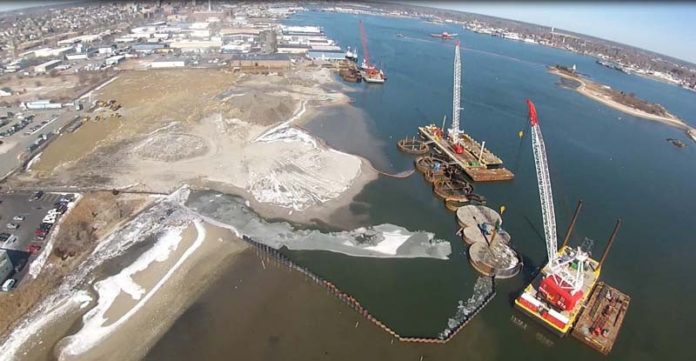
The publicly congenial competition between Rhode Island’s Deepwater Wind and Massachusetts’ Cape Wind to launch the first U.S. offshore wind farm and attract spinoffs is intensifying as both energy companies flaunt contracts for the production of wind turbines.
The assembly and deployment of turbines to the offshore wind farms are likely to be a major revenue generator for states that get in early on wind-energy production.
Massachusetts and the city of New Bedford are eager to get out in front for potentially substantial economic returns.
Construction of the state-financed $100 million New Bedford Marine Commerce Terminal began in April 2013 and is expected to be completed in December. The multipurpose facility is intended as a hub for assembly and deployment of turbines for offshore wind projects.
“The terminal can handle the extraordinarily heavy components for offshore wind turbines,” said Bill White, director of offshore wind-sector development for the Massachusetts Clean Energy Center, a quasi-state agency. “Some of the components weigh up to 500 tons, like the bottom part of the foundation, the pieces that get driven into the sea floor.”
The 28-acre terminal in New Bedford Harbor has 17 acres specially constructed to support the heavy cranes and heavy loads, he said.
“Where things stand now, the majority of the Cape Wind project will be deployed out of the New Bedford Marine Commerce Terminal,” said White. “We anticipate that in early 2015 Cape Wind will begin to deploy components from the marine-commerce terminal.
Cape Wind, which has a planned 130-turbine project in Nantucket Sound, signed a contract with Siemens in December 2013 for the fabrication and installation of wind turbines and an offshore electric-service platform, along with a 15-year service agreement.
Cape Wind announced on Feb. 26, during the Offshore Wind Power USA conference in Boston, it had secured $600 million in financing for its proposed $2.5 billion wind farm and expects to have the rest locked up by end of the third quarter, Reuters reported.
With a laser focus on the emerging industry, the New Bedford Wind Energy Center was created in March 2013 as part of the city’s economic-development council.
“We created the New Bedford Wind Energy Center as an organizing function for all the parts of the industry – business development, workforce development, land-use planning and supply-chain analysis,” said center Managing Director Matthew A. Morrissey, who was previously economic-development director for the city for seven years.
The New Bedford Marine Commerce Terminal is owned, and being built, by the state of Massachusetts and while the wind-energy industry develops, the state and the independent New Bedford Harbor Commission have planned for multiple uses of the new facility.
“We’ve got a huge commercial fishing industry and a huge amount of cold storage and we plan to expand that,” said Ed Anthes-Washburn, deputy port director for New Bedford.
“We have clementines from Morocco, other citrus from Latin America, avocados coming up from Mexico and produce like potatoes and carrots that can withstand a little more time in the hold,” said Anthes-Washburn. “All of the carriers who are currently calling in our port are interested in using the new facility.”
In the longer term, Massachusetts is anticipating the wind-energy industry to grow substantially as the Bureau of Ocean Energy Management continues to lease federal offshore sites for wind farms.
“This is obviously an emerging industry, not just for Massachusetts or Rhode Island. We believe it’s an East Coast area emerging industry,” said White. “If this industry stands up as many anticipate it will, there will be many opportunities for New Bedford and Quonset and other areas along the East Coast for construction, deployment, operations and maintenance.
“We have a very high regard for the team at Quonset,” said White. “We’d like to see this industry emerge so there’s business for all of us.”
Quonset Business Park in North Kingstown will host Deepwater Wind’s manufacturing and assembly operations for its Rhode Island projects, under a Joint Development Agreement with the state. The Providence-based company has maintained an ongoing lease-option agreement for land at Quonset, a $750,000 per year investment beginning in 2009.
“If you’ve ridden the Acela train, you’re familiar with an Alstom product,” Deepwater Wind CEO Jeff Grybowski told a group of 350 business leaders at the Santander Bank and Greater Providence Chamber of Commerce Economic Outlook Breakfast at the Omni Hotel in Providence on March 6.
“Once we made the agreement to purchase the turbines, we made significant payments at the end of the year,” said Grybowski. “The components are being fabricated, all of them will end up in Quonset and we will have a significant workforce assembling components.”
Deepwater also announced on Feb. 14 the selection of Fred. Olsen Windcarrier to provide the vessel for turbine installation.
The Block Island Wind Farm is in the final permitting stages, he said.
“We expect to have the process final – and that will allow us to finalize our financing … and begin some local construction in early 2015,” Grybowski said.
The contract with Alstom provides for long-term maintenance, and according to the February announcement, Alstom intends to base long-term operations in Rhode Island.
Deepwater Wind spokeswoman Meaghan Wims told Providence Business News that the blades being manufactured for the energy company will initially be stored in Denmark.
Grybowski told the economic-outlook group that Deepwater Wind’s larger project, the 200-turbine Deepwater Wind Energy Center, to be located 20 miles offshore in federal waters on a 256-square-mile site the energy company gained in the nation’s first offshore site auction in July 2013, is part of a concept to serve multiple states in New England, as well as New York.
“There are larger markets for wind energy, but we are here because Rhode Island made a commitment to be first. Our strategy as a company is to begin small with a demonstration project and expand to bigger projects to serve the Northeast.” •










